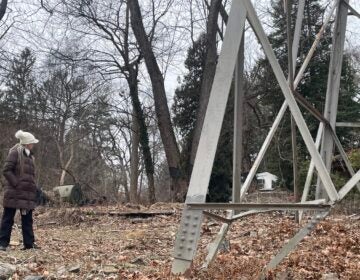Pa. mum on its mulling of riparian rights
By Kellie Patrick
For PlanPhilly
A state review of how the rights to develop riverfront land are granted continues, with no definite end in site.
That means it is unclear when the year-long moratorium on granting these so-called riparian rights – the ones casino companies and others who plan to build along the Delaware River covet – will end.
“There are no specifics on any time tables,” said Edward Myslewicz, spokesman for the state Department of General Services. Staffers from his department, as well as the Department of Environmental Protection and the Governor’s office, are conducting the review.
“We continue to review the process,” said Charles Young, spokesman for the state Department of Environmental Protection. “No final decisions have been made nor has there been any public announcement from the governor’s office.”
Along the Delaware in Philadelphia, riparian land begins at the pier head line – the line that marks the boundary of the shipping channel. Its westernmost boundary is the bulkhead line – the place where a retaining wall is built along the bank, or where one could be or once was.
This land is owned by the state, but the state can grant leases to those who want to use it.
Myslewicz said the entire process is under review, but he could not provide any details about specific elements that were being examined or the goals of the study.
“No one here would be able to talk about any specifics,” he said. “This is still in preliminary stages. When there is a bill introduced, that would be the point – that’s when everything becomes a public process.”
However, Mary Isaacson, spokesman for state Rep. Michael O’Brien – whose district includes the proposed SugarHouse site – said much of the review centers around establishing the market value of the land, so that the state might earn a fair market price on the parcels it leases.
There has also been some discussion about selling some of the land instead of leasing it, she said.
“At one point, that was discussed,” Isaacson said. But no one has come to O’Brien with any interest in buying these rights.
It has been common for the state to grant 99-year leases for $1.
The state is also reviewing title histories of the parcels, she said. “If they want to transfer ownership, they have to be much more meticulous with the title than in just leasing the property.”
Any granting of riparian rights has required an act of the legislature – essentially a separate law for each lease.
Tradition has dictated that a bill to grant riparian rights can only be introduced by a legislator who represented the district in which the riparian land in question was found.
Some local legislators have planned to use this custom to fight casinos. Rep. O’Brien has said he would not introduce riparian legislation until the casinos reach agreements with the neighborhood associations.
Last fall, State Sen. Vince Fumo introduced legislation that would have eliminated the need for any legislator to call for the granting of riparian rights. It failed. But in an interview conducted earlier this year, Myslewicz said the legislator-driven portion of riparian rights likely was part of the review.
Isaacson said it is extremely unlikely the legislature would ever pass a law that would allow the granting of leases without its consent.
“Do you think they could get the legislature to say, ‘We will give up this power and give it to the executive branch? We will extend the executive powers?’” she said.
She also said the legislature could continue to observe the tradition that only someone who represents the district in which to-be-leased land is contained introduces the legislation.
Whatever the state review concludes – whenever it does – Isaacson said she thinks the decision to lease, or even to sell, would be made on a case-by-case basis. She does not expect any new, overriding law will result from the review.
O’Brien will test the moratorium in the next month or so by introducing legislation that would grant riparian rights to developers with their eyes on several of Philadelphia’s piers: Pier 40, Pier 35, and piers 49, 50 and 51 – which is the pier next to Penn Treaty Park.
Isaacson said the developers wish to create residential properties there, with open space and public access to the river – and restroom facilities for Penn Treaty Park.
WHYY is your source for fact-based, in-depth journalism and information. As a nonprofit organization, we rely on financial support from readers like you. Please give today.






